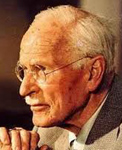 In Modern Man in Search of a Soul, C.G. Jung discusses the psychological impact of a patient believing in the hereafter:
In Modern Man in Search of a Soul, C.G. Jung discusses the psychological impact of a patient believing in the hereafter:
So for many people all too much unlived life remains over—sometimes potentialities which they could never have lived with the best of wills; and so they approach the threshold of old age with unsatisfied claims which inevitably turn their glances backward.
It is particularly fatal for such people to look backward. For them a prospect and a goal in the future are indispensable. This is why all great religions hold the promise of a life beyond; it makes it possible for mortal man to live the second half of life with as much perseverance and aim as the first.
For the man of today the enlargement of life and its culmination are plausible goals; but the idea of life after death seems to him questionable or beyond belief. And yet life’s cessation, that is, death, can only be accepted as a goal when existence is so wretched that we are glad for it to end, or when we are convinced that the sun strives to its setting—”to illumine distant races”—with the same perseverance it showed in rising to the zenith. But to believe has become today such a difficult art, that people, and particularly the educated part of humanity, can hardly find their way there. They have become too accustomed to the thought that, with regard to immortality and such questions, there are many contradictory opinions and no convincing proofs. Since “science” has become the catchword which carries the weight of conviction in the contemporary world, we ask for “scientific” proofs. But educated people who can think, know that proof of this kind is out of the question. We simply know nothing whatever about it.
But here my physician’s conscience awakes and urges me to say a word which is essential to this question. I have observed that a directed life is in general better, richer and healthier than an aimless one, and that it is better to go forwards with the stream of time than backwards against it. To the psychotherapist an old man who cannot bid farewell to life appears as feeble and sickly as a young man who is unable to embrace it. And as a matter of fact, in many cases it is a question of the selfsame childish covetousness, of the same fear, the same obstinacy and willfulness, in the one as in the other. As a physician I am convinced that it is hygienic—if I may use the word—to discover in death a goal towards which one can strive; and that shrinking away from it is something unhealthy and abnormal which robs the second half of life of its purpose. I therefore consider the religious teaching of a life hereafter consonant with the standpoint of psychic hygiene.
Excerpt from the Carl Jung ebook, Modern Man in Search of a Soul